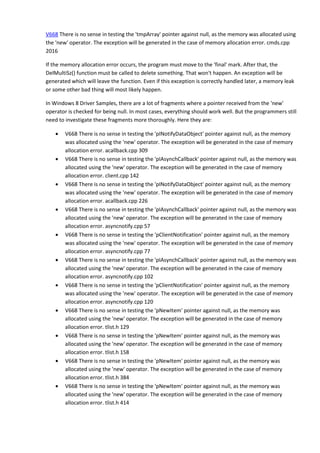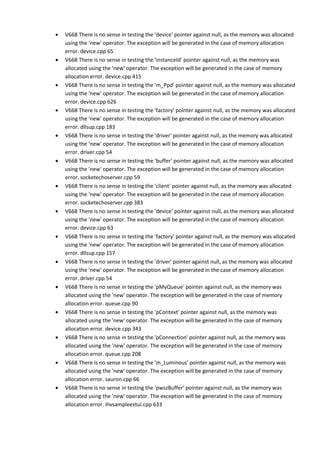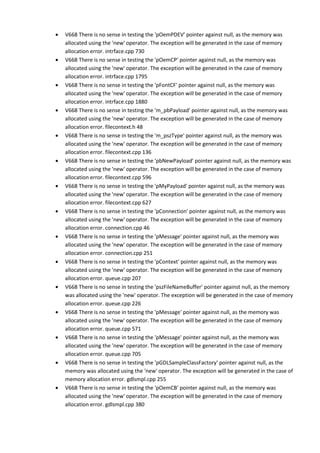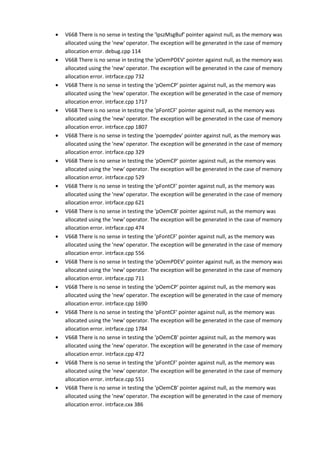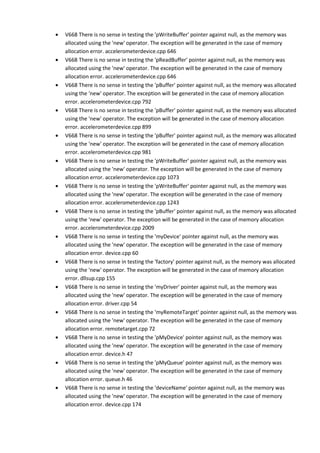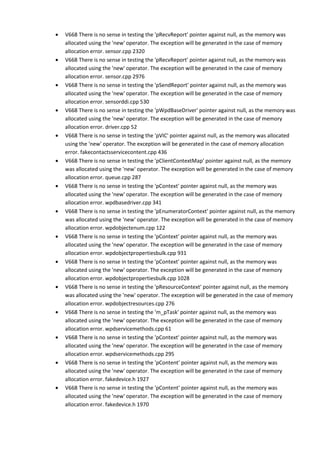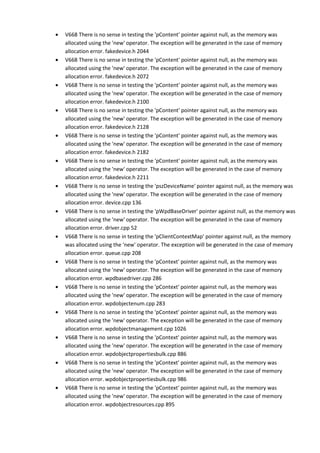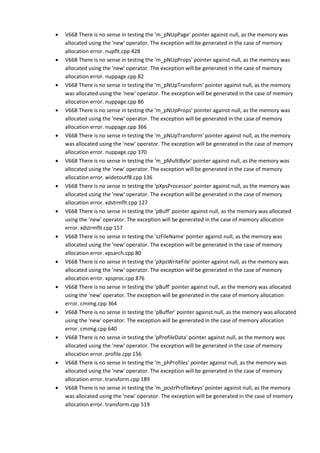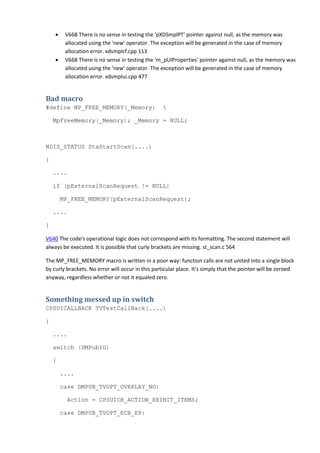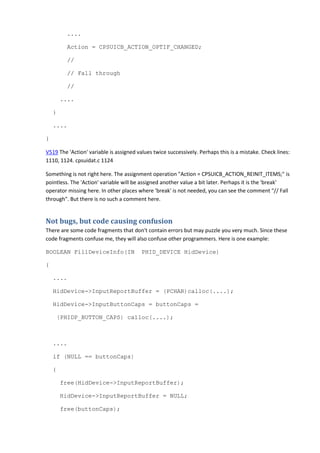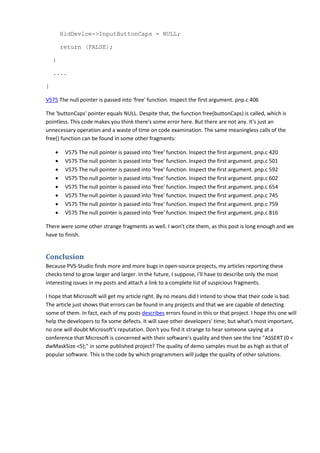The article analyzes bugs found in Windows 8 driver samples using the PVS-Studio tool, noting that these errors could lead to significant issues if developers use these samples as a basis for their own projects. While the Microsoft development team generally produces high-quality code, sample development appears to be deprioritized, resulting in various errors that can propagate to real projects. The document highlights specific coding mistakes and offers suggestions for improving code quality and project integration with development tools.
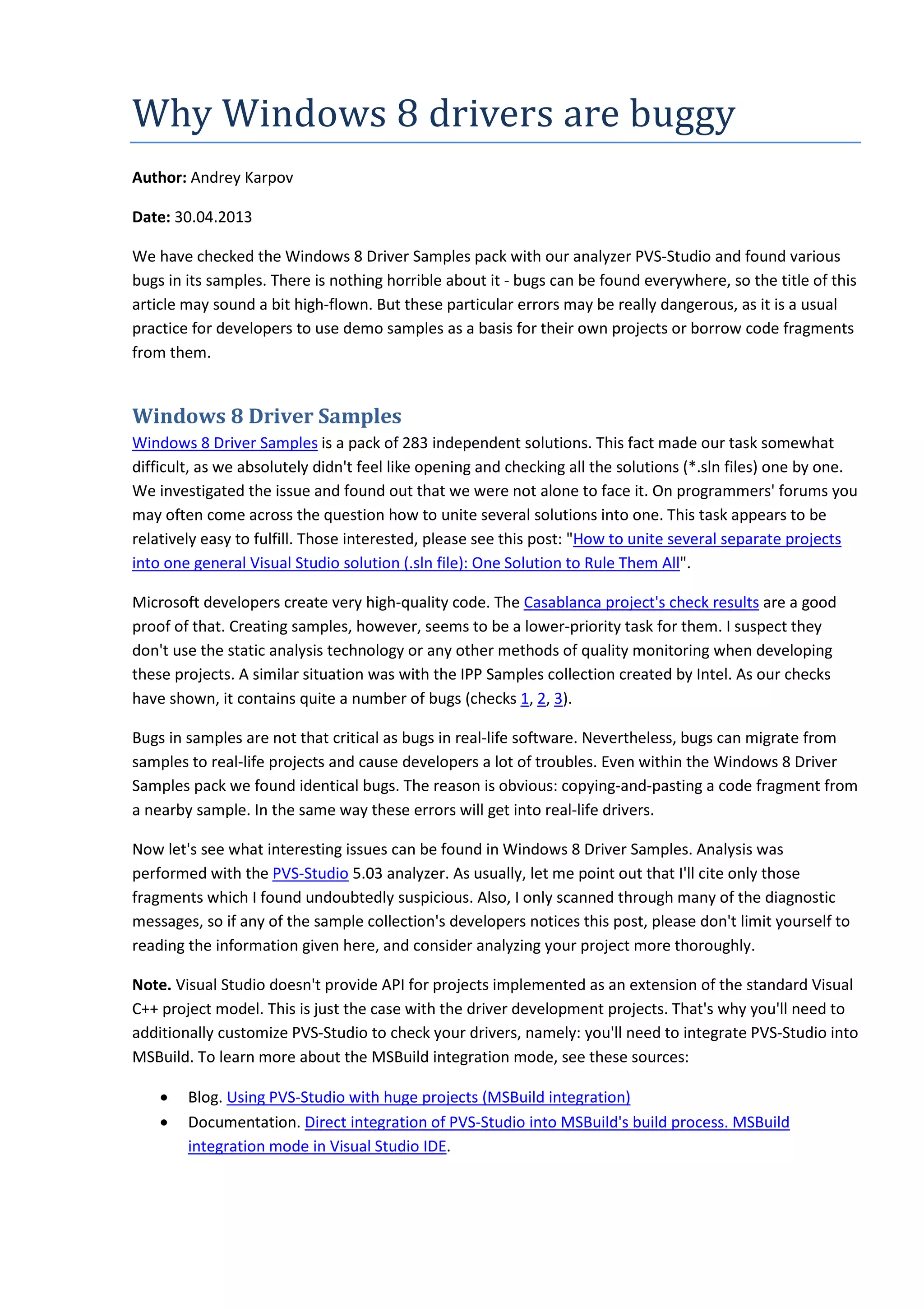
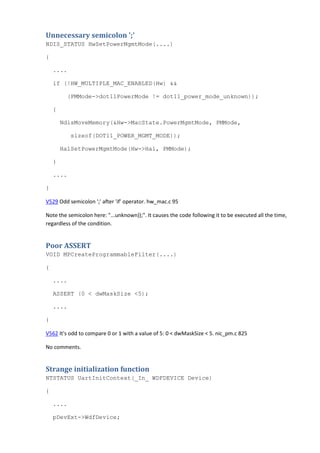
![....
}
V607 Ownerless expression 'pDevExt->WdfDevice'. uart16550pc.cpp 58
I suspect the developers forgot to initialize the variable 'pDevExt->WdfDevice' in the function
UartInitContext (). I cannot say for sure what it should be initialized with.
A misprint
BOOLEAN DsmpFindSupportedDevice(....)
{
WCHAR tempString[32];
....
tempString[(sizeof(tempString) /
sizeof(tempString)) - 1] = L'0';
....
}
V501 There are identical sub-expressions 'sizeof (tempString)' to the left and to the right of the '/'
operator. utils.c 931
A misprint will cause the null terminator to be written at the beginning of the string instead of its end.
The size of the sizeof(tempString) buffer must be divided by the size of one character. But it is divided by
itself instead. This is the fixed code:
tempString[(sizeof(tempString) /
sizeof(tempString[0])) - 1] = L'0';
The programmer forgot that a string consists of WCHAR characters
HRESULT CDot11SampleExtUI::CreateSecurityProperties(....)
{
....
WCHAR wbuf[128];
....
ZeroMemory(wbuf, 128);
....](https://image.slidesharecdn.com/0199whywindows8driversarebuggy-141124034050-conversion-gate02/85/Why-Windows-8-drivers-are-buggy-3-320.jpg)
![}
V512 A call of the 'memset' function will lead to underflow of the buffer 'wbuf'. ihvsampleextui.cpp 288
The ZeroMemory() function will empty only half of the buffer 'wbuf'. Since this code refers to the
'CreateSecurityProperties()' function, we may say we have a potential vulnerability here. This is the fixed
code:
ZeroMemory(wbuf, 128 * sizeof(WCHAR));
Another bug of that kind:
typedef struct _DEVICE_INFO
{
....
WCHAR UnicodeSourceIp[MAX_LEN];
WCHAR UnicodeDestIp[MAX_LEN];
....
} DEVICE_INFO, *PDEVICE_INFO;
PDEVICE_INFO FindDeviceInfo(....)
{
....
PDEVICE_INFO deviceInfo = NULL;
....
memcpy(deviceInfo->UnicodeSourceIp,
InputInfo->SourceIp, MAX_LEN);
memcpy(deviceInfo->UnicodeDestIp,
InputInfo->DestIp, MAX_LEN);
....
}
V512 A call of the 'memcpy' function will lead to underflow of the buffer 'deviceInfo->UnicodeSourceIp'.
testapp.c 729
V512 A call of the 'memcpy' function will lead to underflow of the buffer 'deviceInfo->UnicodeDestIp'.
testapp.c 730](https://image.slidesharecdn.com/0199whywindows8driversarebuggy-141124034050-conversion-gate02/85/Why-Windows-8-drivers-are-buggy-4-320.jpg)
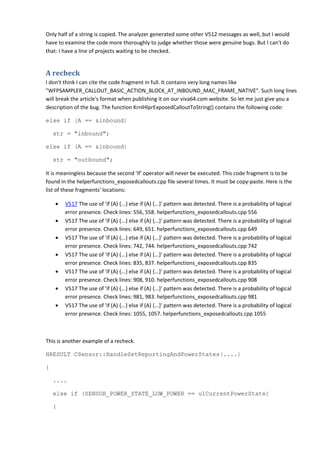
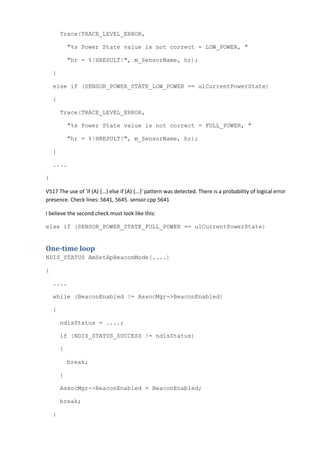
![....
}
V612 An unconditional 'break' within a loop. ap_assocmgr.c 1817
The loop body is executed no more than once. I find the 'break' operator at the end unnecessary.
Incorrect swap?
NTSTATUS FatSetDispositionInfo (....)
{
....
TmpChar = LocalBuffer[0];
LocalBuffer[0] = TmpChar;
....
}
V587 An odd sequence of assignments of this kind: A = B; B = A;. Check lines: 2572, 2573. fileinfo.c 2573
Strange and meaningless code. Perhaps the programmer wanted to swap the "LocalBuffer[0]" array
item's value for another variable. But something was messed up.
A condition not affecting anything
NDIS_STATUS Hw11QueryDiversitySelectionRX(....)
{
//
// Determine the PHY that the user wants to query
//
if (SelectedPhy)
return HwQueryDiversitySelectionRX(HwMac->Hw,
HwMac->SelectedPhyId,
MaxEntries,
Dot11DiversitySelectionRXList
);](https://image.slidesharecdn.com/0199whywindows8driversarebuggy-141124034050-conversion-gate02/85/Why-Windows-8-drivers-are-buggy-7-320.jpg)
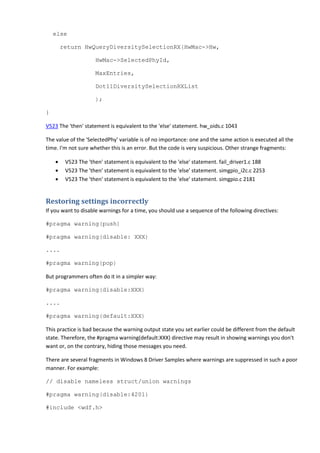

![A potential infinity loop
VOID HwFillRateElement(....)
{
UCHAR i, j;
....
for (i = 0; (i < basicRateSet->uRateSetLength) &&
(i < 256); i++)
{
rate[i] = 0x80 | basicRateSet->ucRateSet[i];
}
....
}
V547 Expression 'i < 256' is always true. The value range of unsigned char type: [0, 255]. hw_mac.c 1946
An infinity loop may occur here. The 'i' variable has the UCHAR type. It means that its value range is
from 0 to 255, that is, any of its values is always below 256. The loop appears to be limited only by the (i
< basicRateSet->uRateSetLength) condition.
A similar bug can be found in this fragment:
VOID HwFillRateElement(....)
{
....
UCHAR rate[256];
UCHAR rateNum;
....
if (rateNum == sizeof(rate) / sizeof(UCHAR))
break;
....
}
V547 Expression is always false. The value range of unsigned char type: [0, 255]. hw_mac.c 1971
The "sizeof(rate) / sizeof(UCHAR)" expression equals 256. The 'rateNum' variable has the UCHAR type. It
means that the condition will never hold.](https://image.slidesharecdn.com/0199whywindows8driversarebuggy-141124034050-conversion-gate02/85/Why-Windows-8-drivers-are-buggy-10-320.jpg)
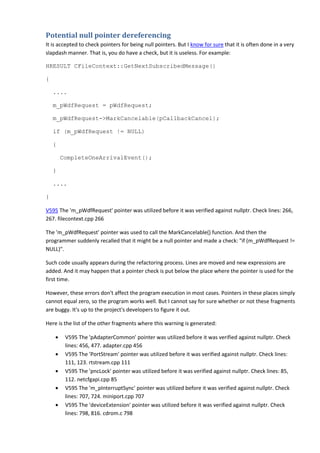


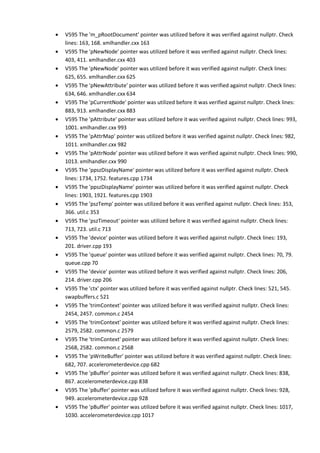

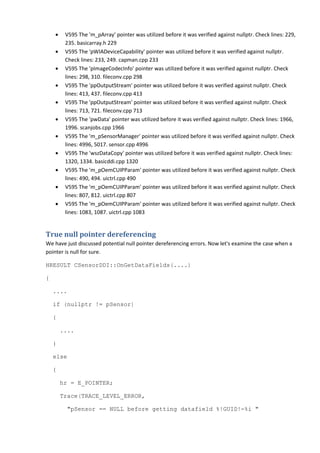
!["value from %s, hr = %!HRESULT!",
&Key.fmtid, Key.pid, pSensor->m_SensorName, hr);
}
}
V522 Dereferencing of the null pointer 'pSensor' might take place. sensorddi.cpp 903
If the 'pSensor' pointer equals zero, you want to save the related information into the log. But it's
obviously a bad idea to try to take the name using "pSensor->m_SensorName".
A similar error can be found here:
V522 Dereferencing of the null pointer 'pSensor' might take place. sensorddi.cpp 1852
Strange loop
VOID ReportToString(
PHID_DATA pData,
_Inout_updates_bytes_(iBuffSize) LPSTR szBuff,
UINT iBuffSize
)
{
....
if(FAILED(StringCbPrintf (szBuff,
iBuffSize,
"Usage Page: 0x%x, Usages: ",
pData -> UsagePage)))
{
for(j=0; j<sizeof(szBuff); j++)
{
szBuff[j] = '0';
}
return;
}
....](https://image.slidesharecdn.com/0199whywindows8driversarebuggy-141124034050-conversion-gate02/85/Why-Windows-8-drivers-are-buggy-17-320.jpg)
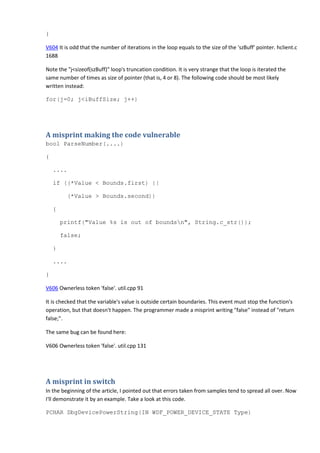
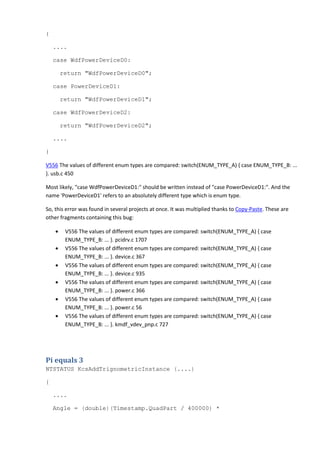
![(22/7) / 180;
....
}
V636 The '22 / 7' expression was implicitly casted from 'int' type to 'double' type. Consider utilizing an
explicit type cast to avoid the loss of a fractional part. An example: double A = (double)(X) / Y;. kcs.c 239
This is a strange integer division. Why not write 3 right away? Perhaps it would be better to write
(22.0/7). Then we'd get 3.1428.... By the way, Wikipedia prompts us that the fraction 22/7 is sometimes
used to get an approximate value of Pi. Well, then the programmer has got a VERY approximate value in
this sample.
Vestiges of the past
Long ago the 'new' operator used to return 0 if a memory allocation error occurred. Those times are
long gone. Now, according to the standard, the 'new' operator throws the std::bad_alloc() exception if
an error occurs. But many programmers either don't know or forget about this thing, or use their
ancient code still containing such checks.
No problem, one may say. Just an extra check, that's alright. Well, the point is that a program is usually
designed to perform some additional actions in case of an error. For instance it should release memory
or close a file. But now it throws an exception when there is not enough memory, and the code that
must handle it remains idle.
Have a look at this sample:
int SetHwidCallback(....)
{
....
LPTSTR * tmpArray = new LPTSTR[cnt+2];
if(!tmpArray) {
goto final;
}
....
final:
if(hwlist) {
DelMultiSz(hwlist);
}
return result;
}](https://image.slidesharecdn.com/0199whywindows8driversarebuggy-141124034050-conversion-gate02/85/Why-Windows-8-drivers-are-buggy-20-320.jpg)
